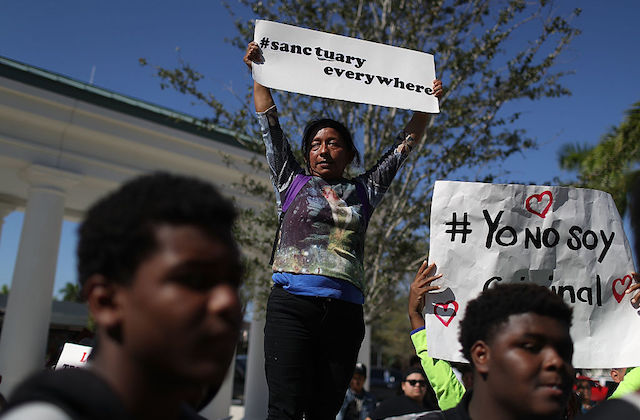A new report says that while many municipalities have adopted the “sanctuary city” label, their local practices can actually undercut the promise the phrase conveys.
Released today (May 4), “The Promise of Sanctuary Cities and the Need for Criminal Justice Reforms in an Era of Mass Deportation” is a joint project of Harvard Law School’s Fair Punishment Project, the Immigrant Defense Project and the Immigrant Legal Resource Center.
From the report:
Broken windows [policing] and other policies that harshly penalize low-level offenses have laid the groundwork for President Trump to identify, and then deport, immigrants charged with the smallest infractions: urinating in public, driving without a license, subway turnstile jumping, or using a small quantity of marijuana, among others. This deliberate incarceration is alarming in its own right. For those worried about mass deportations, it is terrifying.
“If mayors truly want to protect immigrants from deportation, they need to act swiftly to end harmful criminal justice practices that criminalize poverty,” Jessica Brand, legal director for the Fair Punishment Project, said in an emailed statement. “It is inspiring that many cities, from Portland to New York, have local leaders who have boldly declared their cities to be ‘sanctuary’ cities, but unless these leaders work to mitigate the risk that harsh criminal justice policies impose on all citizens, especially immigrants, the promise of sanctuary will be meaningless.”
The report details some criminal justice policies that the authors say are at odds with providing sanctuary for undocumented immigrants. From the statement:
In New York, the Police Department arrests people for selling single cigarettes, jumping subway turnstiles, or trespassing.
Los Angeles has, according to a 2016 study by the Policy Advocacy Clinic at Berkeley Law, 15 laws against “sitting, standing and resting,” eight laws against “sleeping, camping and lodging,” and nine laws against “begging and panhandling.”
In Portland, Oregon, the Multnomah County District Attorney has a “Neighborhood Unit” that focuses on prosecuting low-level, “quality-of-life” offenses such as trespassing, disorderly conduct, and public urination.
The report also preposes eight reforms for cities that wish to align their rhetoric with their policies:
- End all local collusion with ICE.
- Do not enter into 287(g) agreements.
- Stop asking for cash bail.
- Decriminalize certain offenses.
- End “broken windows” policing.
- Consider immigration consequences in discretionary decisions.
- Ensure public defenders have the resources to meet constitutional obligations to noncitizen clients.
- Get police out of local schools and end probation reporting of youth to immigration authorities.
Read the full report here to learn more about how these reforms could impact the lived experiences of undocumented immigrants in the United States.
